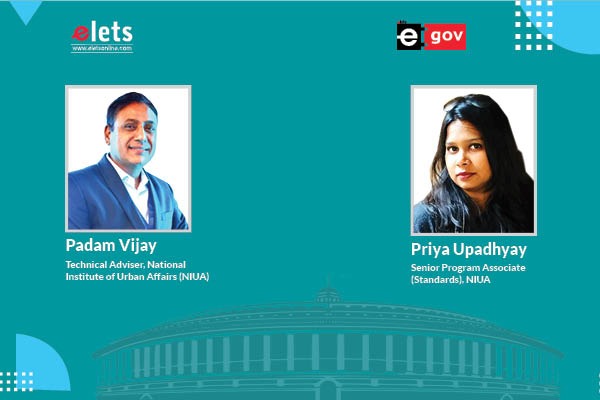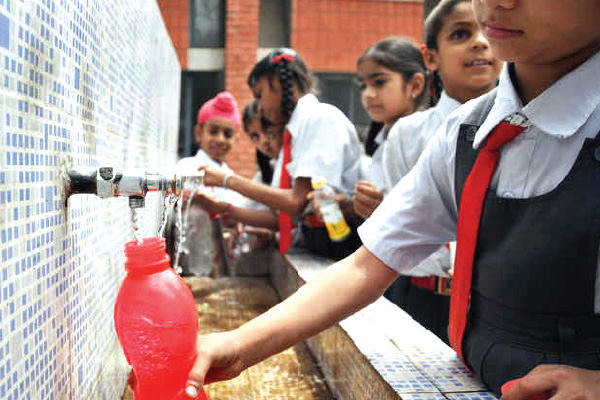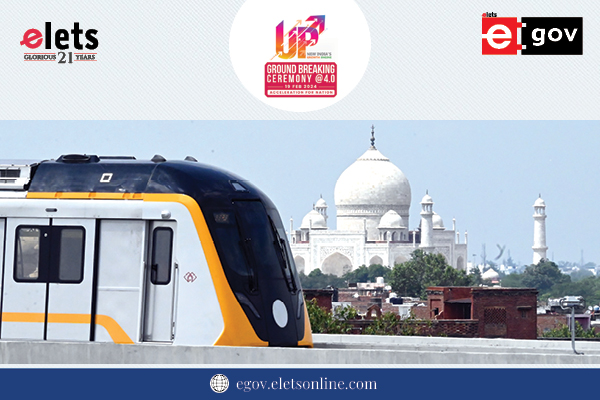
Governments worldwide aim to make civic services accessible to the citizens in their locality and ensure efficiency, transparency & reliability of such services at affordable costs. In order to meet this objective, there is a need to integrate information across departments and organisations for better cooperation and collaboration, write Padam Vijay, Technical Adviser, National Institute of Urban Affairs (NIUA) and Priya Upadhyay, Senior Program Associate (Standards), NIUA.
An example to the aforementioned scenario could be Multifunctional Centres (MFC) in Russia¹, a program initiated to streamline and standardise activities of public and municipal services through standardisation of data entities, as per municipal legal acts by the principle of “one window” to ensure transparency of public bodies.
The government systems are generally characterised by islands of systems and therefore, standardisation of municipal services is a challenge across the world resulting in lack of interoperability (interlinking of information, systems, applications and ways of working) not only within governmental departments, but also in their interaction with the administration, enterprises, and public.

In the context of Sustainable Development Goal (SDG) 6 – ensuring availability and sustainable management of water and sanitation for all – it follows a century-long international effort by United Nations (UN) to improve water access.
However most developing countries manage water and sanitation at the subnational level, yet global monitoring rarely considers local governance. Due to national assessments of the sector, many water experts disagree the results as definitions chosen, data collection and missing data, measurement and analysis strategies are highly uneven progress across regions².
Challenges to evolving sustainable, equitable and efficient management of water resources are several. But the non-availability of adequate scientific data on quantity and quality of water, demand for water in different sectors, nature and extent and causes of water problems become major hindrances to developing sustainable water management strategies³. The Aspen- Nicholas Water Forum have recommended that the governments should take initiative in the standardisation of data particularly on how to curate, store, and make use of new streams of data that have broad societal relevance for better water management and planning.

India is leapfrogging into the Fourth Industrial Revolution, with government still at the center of that transformation. Digital India was conceived five years ago as a way to push the country’s digital transformation forward and empower citizens in the process. The base of these efforts has been the government’s emphasis on developing infrastructure to enable affordable internet access for all and for every Indian to possess a digital identity⁴.
India has witnessed an unprecedented increase in the scale and pace of urbanisation resulting in rapidly growing problems pertaining to the delivery of basic services – access to water, sewerage system and sanitation.
With a growing economy and changing lifestyles, the pressure on existing services, specially already strained water resources is increasing. Existing data in the sector from regulatory authorities is limited in terms of quality. When different stakeholders refer to different sources of information and have different points of view, it is difficult to identify successful solutions to the increasing challenges in provisioning of water supply and sanitation.

Safe drinking water in schools needs immediate attention
Source: https://images.tribuneindia.com
Although water and sewerage (W&S) data is widely available on the type and location of drinking water sources used by households, availability and safety of drinking water are available through a combination of household surveys and administrative sources including regulators, census and various other sources, yet the data entities and definitions are still to be standardised in India.
To solve these issues in government service delivery and bring an ecosystem with data driven approach to problem solving, the Ministry of Housing and Urban Affairs launched National Urban Digital Mission (NUDM)⁵ in February 2021 which aims to streamline and coordinate efforts of the urban ecosystem and thus to improve the ease of living for citizens by creating a national urban digital ecosystem that delivers accessible, inclusive, efficient and citizen-centric governance in India’s 4700+ towns and cities.
Also Read | Pathways for Achieving Drinking Water Security in Urban India
One of the key deliverables under NUDM is creation/adoption of municipal governance standards to promote data usage, data driven governance and to enable interoperability (foundational, structural & semantic) of data, processes and systems in urban local bodies (ULBs), in a secure manner. These initiatives are being undertaken by NIUA in coordination with the relevant urban stakeholders. The following standards (in various stages of development/ adoption) are identified for NUDM:
1. Municipal Governance Reference Architecture as a reference blueprint for platforms
2. Domain Knowledge Standards with key data elements and their standardised data interpretation
3. API definitions for standardised integration with the National Dashboard
4. Security Assurance Standards for enabling data privacy controls
5. National meta-data standards for data quality enablement in State/ UT & National dashboards.
These standards are one way to ensure that different components of a large mission/ program can be built independently, in geographically different places, at different times, by different agencies and yet the components can interface, interact and transact in a consistent and robust manner, without loss of information and interpretation. Standardisation gives a way to ensure that all government agencies including ULBs, can have basic minimum provisions and methods to enable and provide transparent, efficient, reliable and accountable services.
The Domain knowledge standards, as mentioned above, are aimed to encourage data culture in ULBs as well as solve the pressing issue of semantic interoperability. The standards can further help by;
● Identifying and categorizing important data elements for a domain
● Resolving differences in terminology for urban governance
● Analyse current city domain models, processes, reports & KPIs, thus, retrofitting existing data models and methods with missing data
NIUA has recently released the DRAFT Knowledge Standard for Water & Sewerage which is under wider industry consultation. These standards have been prepared in consultation with various urban stakeholders comprising government agencies, academia, industry, citizen community, practitioners, etc. and provide a holistic approach to solve the pressing issue of data inconsistency in the domain of water supply and sewerage. It will help the ULBs to collect, collate and analyse the data in a systematic manner. The standard aim to enable common language across the service provisions which will help the governments to obtain interoperability and comparability.
Adoption of the Water & Sewerage Knowledge Standards will enable ULBs to directly apply the data elements in their day-to-day operations for eg; the data captured through various access channels will help in assessing the digital adoption of the service amongst users. This will also help in analysing how many users need an intervention to access services through physical or digital channels/ assess, whether the services are accessible to the marginalised section of the society.
Also, the quality of municipal service is considered as the degree of satisfaction of customer’s expectations, compliance with the prescribed requirements and Service Level Guarantees (SLG), the ULBs can monitor the requests as per SLGs to plan and deliver better service. By using the data from these indicators, ULBs can implement corrective measures to achieve SDG 6.1 (achieve universal and equitable access to safe and affordable drinking water for all).
Also Read | India’s Water Security A Roadmap to Achieving SDG 6.1 & AMRUT 2.0
The standards will pave a way for better planning and decision making in W&S based on real-time data on water & sewerage demand and supply by simply analysing a number of connections, type of connection, area of connections etc. It also provides an opportunity to collect data on water conservation, land use, leakages and pollution which are some of the direct concerns in achieving the SDGs.
Adoption of the standards is not only beneficial for ULBs and solution providers, but it also provides new ways and methods of understanding the problems in the water & sewerage sector opening a number of opportunities for innovations and solutions to solve the persisting issues in the sector.
Leveraging the use of standards will certainly help in better management of resources, planning and provision of equitable and universal access to the water supply. Also, enabling a mechanism to monitor and localising SDG 6 based on relevant data.
Domain knowledge standards are part of the many initiatives that NIUA is taking in bringing an ecosystem approach to municipal services. Going forward, we are planning to initiate work on the adoption of these standards, developing new standards for technology integration and enhancement. We strongly believe that Standards cannot be a silo approach and participation of the entire value chain in the urban domain including industry, academia, civil society and government organisations is crucial to develop something which can be put to use for efficient and effective municipal service delivery by engaging in activities such as capacity building and adoption of standards in various systems.
1. Alpatov, Y. M., Ostanina, S. S., & Avilova, V. V. (2016). Regulation and Standardization of State and Municipal Services as Imperative of Their Quality and Affordability. IEJME — Mathematics Education, 2442-2454.
2. Herrera, V. (2019). Reconciling global aspirations and local realities: Challenges facing the Sustainable Development Goals for water and sanitation. World Development, 106-117.
3. The Aspen Institute. (2015). Data Intelligence For 21st Century Water Management – A Report From The 2015 Aspen-Nicholas Water Forum. United States of America in 2015 by The Aspen Institute.
4. Gupta , A., & Auerswald, P. E. (2019). The Ups and Downs of India’s Digital Transformation. Retrieved from Harvard Business Review: https://hbr.org/2019/05/the-ups-and-downs-of-indias-digital-transformation
5. Ministry of Housing and Urban Affairs. (2021, Feburary). National Urban Digital Mission. Retrieved from National Urban Digital Mission: https://nudm.mohua.gov.in/about-what-is-nudm/
Be a part of Elets Collaborative Initiatives. Join Us for Upcoming Events and explore business opportunities. Like us on Facebook , connect with us on LinkedIn and follow us on Twitter, Instagram.











